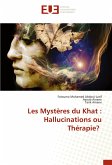Khat (Catha edulis Forsk) is a plant deeply rooted in the social and cultural traditions of the Arabian Peninsula and East Africa. Its chewing is a common practice in Djibouti and Yemen, seen as a way of preserving food traditions and adapting to local environments. The psychoactive effects of khat are mainly due to cathinone, a compound similar to amphetamines, as well as other phenylethylamines. The main effects of khat are euphoric and stimulating, enhancing the physical and mental capacities of users.Research has explored the use of khat alkaloids for pharmaceutical treatments. Khat's recently-discovered cytotoxic properties are sparking interest in its potential as a chemotherapy agent.Despite the potential benefits, this book highlights several points, including the effects of khat, the variability of reported effects and the methodological limitations of some studies. In addition, the disparity in the legality and regulation of khat across different countries complicates the establishment of coherent and effective public health policies.
Bitte wählen Sie Ihr Anliegen aus.
Rechnungen
Retourenschein anfordern
Bestellstatus
Storno








